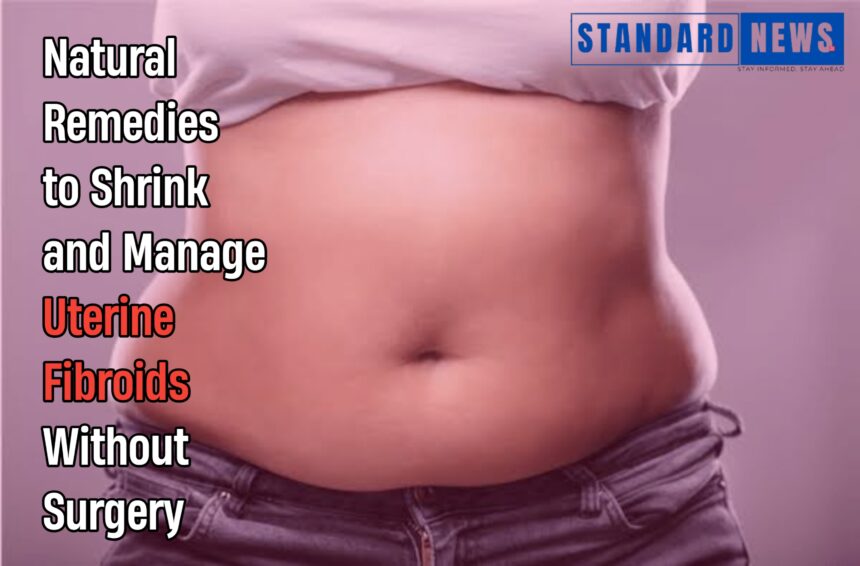Uterine fibroids are non-cancerous growths that affect millions of women, especially African women aged 25–45. While medical treatment and surgery are effective, many women seek natural remedies to shrink fibroids and manage symptoms like heavy bleeding, bloating, or pelvic pain.
This article explores safe and science-backed natural methods that can help reduce the size and impact of fibroids over time.
1. Eat a Hormone-Balancing Diet
Why it helps:
Fibroids are hormone-sensitive (especially to estrogen). Eating anti-inflammatory and hormone-balancing foods can slow their growth.
What to eat more of:
Leafy greens (spinach, kale, ugu)
Cruciferous vegetables (broccoli, cabbage)
Garlic and onions
Whole grains (millet, oats, brown rice)
Fruits like berries, apples, and citrus
Avoid or limit:
Red meat
Processed sugar
Dairy (especially full-fat)
Caffeine and alcohol
2. Herbal Remedies
Some herbs are believed to help regulate hormones and reduce inflammation:
Green Tea Extract (EGCG): May shrink fibroids and ease pain
Castor Oil Packs: Applied on the lower abdomen to improve circulation
Vitex (Chasteberry): Helps balance progesterone levels
Turmeric: A powerful anti-inflammatory that may help shrink fibroid tissue
Important: Always consult a doctor or herbalist before starting herbal treatments, especially if you’re on medication or trying to conceive.
3. Manage Stress Levels
Why it helps:
Chronic stress can increase hormone imbalance. Lowering stress may support fibroid management.
Try:
Daily deep breathing
Gentle yoga or stretching
Prayer or meditation
Journaling or art therapy.
4. Maintain a Healthy Weight
Why it helps:
Fat cells produce excess estrogen, which can feed fibroids.
Losing 5–10% of body weight can improve hormonal balance and reduce symptoms.
5. Detox the Liver Naturally
Why it helps:
The liver processes estrogen. Supporting it may prevent excess estrogen buildup.
Detox tips:
Drink warm lemon water in the morning
Take dandelion root or milk thistle tea
Avoid alcohol and fried foods
Drink enough water daily (at least 2.5 liters).
6. Track Your Menstrual Health
Use period tracking apps to monitor changes in bleeding, pain, or cycle length. This helps you and your healthcare provider see what remedies are working.
7. Consider Natural Supplements
Some supplements may help shrink or slow fibroid growth:
Vitamin D – Low levels are linked to larger fibroids
Omega-3 fatty acids – Anti-inflammatory benefits
Magnesium – Helps reduce cramps and PMS symptoms.
When to See a Doctor
Natural remedies can help, but they’re not a substitute for medical care when symptoms are severe. See a gynecologist if:
You bleed excessively
Experience intense pelvic pain
Have trouble conceiving
Feel a hard mass in your lower abdomen.
Natural remedies can support your body’s healing and help manage fibroids, especially in their early stages. Consistency, patience, and a healthy lifestyle are key.
> Every woman’s body is different. Combine natural options with regular checkups for the best outcome.






